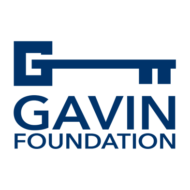Effective Programming
We employ evidence-based practices in all of our treatment programs, including:
- Cognitive Behavioral Therapy: recommended to assist individuals, including offenders, in identifying, correcting and eliminating thinking errors, and to distinguish among feelings, thoughts and facts. CBT is a component of NREPP listed programs, MET-CBT, 12-Step Facilitation, and A-CRA. Gavin Foundation applies this methodology in all settings.
- Motivational Enhancement-Cognitive Behavioral Therapy (MET-CBT) 5 and 7: documented to be effective with marijuana users, Gavin Foundation staff are trained and certified in using MET-CBT.
- 12-Step Facilitation: Gavin Foundation uses this methodology to engage individuals in 12-Step group participation. We provide substantial ‘scaffolding’ of 12-step involvement through our community based AAWOL program.
- 12-Step Participation: involvement in 12-step programs facilitates recovery and integration in communities by providing opportunities for form positive, supportive relationships with individuals and groups. Gavin Foundation structures 12-step involvement by requiring participation in the AAWOL program for all TIP enrollees, and all clients of residential rehabilitation programs.
- A-CRA: A 12- to 14-session, community based manual-guided treatment that uses individualized, flexible behavioral approaches focusing on the development of coping skills for both the youth and the primary caregivers.
- Relapse Prevention: Evidence based methodologies, motivational interviewing and enhancement; MET-CBT; 12-step participation, have been shown to promote skill development and attitude change contributing to preventing relapse. We utilize an evaluation system with the Alcohol & Drug Self-Efficacy Scale, an instrument which has clinical applications in identifying individual vulnerabilities for relapse.
Assessing Effectiveness
Mindful that continued growth and improvement requires periodic assessment and reflection, Gavin Foundation has established a comprehensive system of program evaluation and client and staff feedback. This system includes:
- Alcohol and Drug Self-Efficacy Scale: A 20-item instrument, using a 5 point scale to measure confidence to refrain from drinking alcohol or using drugs during the past week. In addition to serving as a reliable, valid outcome measure, this scale allows clinicians to differentiate specific relapse risk-related circumstances.
- 12 Step Participation Questionnaire: A questionnaire related to active involvement in 12-step programs, allowing client to check off which steps he or she has worked.
- Client Self-Evaluation: A 15 item instrument using a 5 point scale to measure client assessment of self-esteem and decision-making ability. It is made up of two subscales, self-esteem and decision-making, drawn from the Texas Christian University, Institute of Behavioral Research Client Evaluation of Self and Treatment Scale.
- Satisfaction Surveys: Clients and families of youth program residents are asked to complete quarterly surveys, rating their satisfaction with services, the effectiveness of services received, interactions with staff, and their own progress.
Staff Development
The Gavin Foundation has a comprehensive program to promote learning for our staff, which includes monthly in-service training to develop and hone staff skills. All Gavin Foundation staff receive regular supervision and direct service staff are supervised by licensed clinicians.
In-service sessions include such topics as:
- Substance use disorders
- Treatment Planning
- Relapse prevention
- HIV/AIDS, and HepC prevention and treatment
- Addictive Behaviors
- Psychopharmacology
